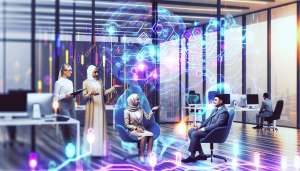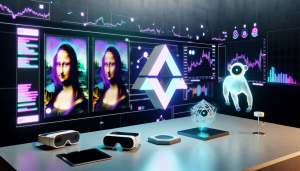Decentralized Finance (DeFi) has revolutionized the traditional financial landscape by leveraging blockchain technology to create open, permissionless financial systems. As DeFi continues to grow, the integration of Artificial Intelligence (AI) agents is playing a pivotal role in enhancing its capabilities. This article explores the synergy between AI agents and DeFi, highlighting their applications, benefits, challenges, and future prospects.
## Understanding AI Agents in DeFi
AI agents are intelligent software programs designed to perform tasks autonomously by analyzing data, making decisions, and executing actions without human intervention. In the context of DeFi, AI agents interact with decentralized applications (DApps), smart contracts, and blockchain networks to optimize financial operations.
## Applications of AI Agents in DeFi
### Automated Trading and Market Making
AI agents excel in analyzing vast amounts of market data to execute trades at optimal times. They can identify arbitrage opportunities, manage liquidity pools, and adjust trading strategies in real-time, ensuring efficient market operations and maximizing returns for participants.
### Risk Management and Fraud Detection
Managing risk is crucial in the volatile DeFi ecosystem. AI agents can assess the risk profiles of various financial instruments, predict market trends, and detect unusual patterns that may indicate fraudulent activities. By proactively identifying potential threats, AI enhances the security and stability of DeFi platforms.
### Smart Contract Audits
Smart contracts are the backbone of DeFi applications, automating trustless transactions and agreements. AI agents can perform comprehensive audits of smart contracts, identifying vulnerabilities and ensuring that the code is secure and free from bugs. This reduces the likelihood of exploits and enhances user confidence.
### Personalized Financial Services
AI agents can analyze user behavior and preferences to offer personalized financial advice, investment strategies, and portfolio management. By tailoring services to individual needs, AI enhances user engagement and satisfaction within DeFi platforms.
## Benefits of Integrating AI Agents in DeFi
### Enhanced Efficiency and Speed
AI agents can process and analyze data at speeds unattainable by humans, enabling swift decision-making and execution of transactions. This results in more efficient financial operations and a more responsive DeFi ecosystem.
### Improved Accuracy and Reliability
AI-driven analysis minimizes human error, ensuring more accurate predictions and strategies. This reliability is critical in maintaining the integrity and trustworthiness of DeFi platforms.
### 24/7 Operations
Unlike traditional financial systems limited by business hours, AI agents can operate continuously, providing round-the-clock monitoring, trading, and management. This constant vigilance enhances the overall functionality and reliability of DeFi services.
## Challenges and Considerations
### Security Concerns
While AI agents enhance security through fraud detection and risk management, they also present new attack vectors. Ensuring that AI systems themselves are secure against hacking and manipulation is paramount to maintaining the integrity of DeFi platforms.
### Transparency and Explainability
AI algorithms often operate as “black boxes,” making it difficult to understand how decisions are made. In the transparent and trustless environment of DeFi, ensuring that AI-driven decisions are explainable and understandable is essential for user trust.
### Regulatory and Ethical Issues
The integration of AI in DeFi raises questions about compliance with financial regulations and ethical considerations. Navigating the evolving regulatory landscape requires careful planning and adherence to legal standards to prevent potential conflicts and ensure sustainable growth.
## Future Prospects of AI in DeFi
The future of AI in DeFi is promising, with potential advancements including more sophisticated trading algorithms, enhanced security protocols, and deeper personalization of financial services. As AI technology continues to evolve, its integration into DeFi is expected to drive innovation, making decentralized financial systems more robust, efficient, and user-friendly.
## Conclusion
AI agents are transforming the DeFi landscape by bringing automation, efficiency, and advanced analytical capabilities to decentralized financial systems. Their applications in trading, risk management, smart contract auditing, and personalized services are enhancing the functionality and security of DeFi platforms. However, addressing challenges related to security, transparency, and regulation is crucial for the sustainable integration of AI in DeFi. As technology advances, the collaboration between AI and DeFi holds the potential to unlock new opportunities and drive the next wave of financial innovation.



